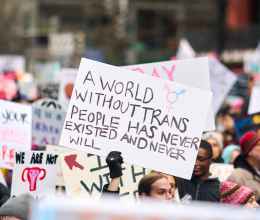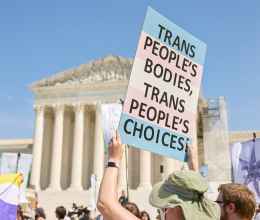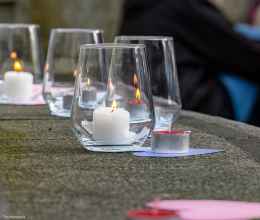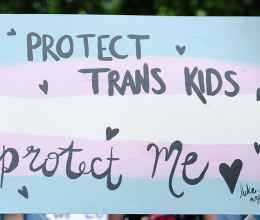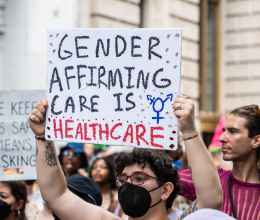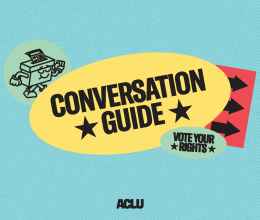
She dances. She plays piano. She volunteers with ski patrol. She participates in orchestra and speech. She paints and knits. Sometimes she even complains about not having more spare time.
But Olivia Data wouldn’t have it any other way.
Olivia, a 17-year-old junior at Century High School in Bismarck, is committed to making North Dakota better for everyone – which is why she’s also active with Student Advocates of North Dakota. The student activist believes it’s important to be involved in her community, which is why she recently testified in front of the Senate Judiciary Committee in opposition to House Bill 1298, discriminatory legislation targeting transgender student athletes.
QUESTION: Tell us a little bit about yourself.
ANSWER: I am 17 years old and I’m a junior at Century High School. I have an older brother and an adorable dog named Keeper. I take and teach piano lessons, I’m in ballet, orchestra, speech, SAND, and ski patrol, and in my spare time, I love to knit, paint, and complain about not having more spare time.
QUESTION: Why are you involved in Student Advocates of North Dakota (SAND)?
ANSWER: When I first joined SAND, I wasn’t sure what to expect other than getting to meet with other progressive students in the area. North Dakota has many wonderful things to offer, but it also has a lot of prejudice, and I wanted a space to be able to talk about that. While I have been able to both share my experiences and hear others’ stories through the club, I have also had opportunities to actually speak out in our community that I never would have thought possible, the most recent of which being our protest and testimonies against House Bill 1298. As a teenager, a student, and an individual trying to improve or even call attention to any of the prejudice rampant throughout North Dakota seems incredibly daunting. But as a member of SAND, I get to work with others like me who care about these issues and want to make a difference. It’s really inspiring.
Q: Why do you think it’s important for young people to be involved in their communities?
A: If you don’t make a habit of staying informed and empathetic as a kid, it will be that much more difficult to fulfill civic duties as an adult. Especially in the school system, there is a lot of stigma around bringing up political controversy before a certain age, and instead of protecting us, it just promotes ignorance. By getting involved in our communities as young people, we are able to challenge the ideas around us and contribute to the decisions that will affect us for the rest of our lives.
Q: Do you have any advice for someone who might be interested in getting more politically involved in their community?
A: Political issues can seem horribly overwhelming. I think one of the most important things to remember is that it’s not about doing everything – It’s about doing what you can. Depending on a person’s schedule, financial issues, or emotional state, that could range from posting something on Instagram to running in an election – and all of that is important. Also, listen to others! I think a lot of us get interested in politics because of a personal connection with an issue, so it is important every now and then to take a step back and make sure we aren’t speaking over other groups or losing sight of the big picture.
Q: When did you first hear about the ACLU?
A: I’ve always looked up to Ruth Bader Ginsburg as a defender of women’s rights, and I first heard about the ACLU when learning about her work with the Women’s Rights Project in middle school. I’ve heard more about the ACLU fairly recently concerning the lawsuits being brought against states that restrict people with uteri’s right to an abortion.
Q: Which of the Constitution’s Amendments are most important to you and why?
A: The first section of the Fourteenth Amendment says, among other things, that no person can be deprived of life or liberty without due process of law. Since the very foundation of America, there has been quite a bit of dissonance between what America claims to stand for (freedom for all, equal opportunities) and what America has done. Hostility to immigrants, racial injustice, and countless other forms of discrimination are still shockingly prevalent today, but to me, this section of the Constitution serves as a reminder of what America should be: a nation that does not oppress its people nor deny its freedom from outsiders, but promotes equality and justice for everyone.
Q: What issues do you think are most important for the North Dakota Legislature?
A: North Dakota does not currently have any laws that prohibit the use of a “panic defense” in terms of violence committed against those in the LGBTQ+ community. We do, however, have a bill currently proposed (House Bill 1298) that would discriminate against transgender student athletes. The most important issue for our legislature would be to prevent the discrimination of North Dakotans based on race, sex, or sexual orientation instead of actively perpetrating it.
Q: Which of the ACLU’s issue areas are you particularly passionate about and why?
A: I am very passionate about women’s rights! I have a personal connection with sexism as a girl in North Dakota, and over the past few years especially, I have realized that this issue goes much deeper than what many people believe. A lot of misogyny is normalized or downplayed to the point where we are taught to just brush it off - whether it’s catcalling, toxic gender roles, the wage gap, or anything else – so I am very interested in the ACLU’s advocacy for women.
Q: What plans do you have after high school?
A: Currently, I am considering a career in art restoration. I am interested in both science and the arts, so that seems like a fascinating field of work and study! At this point in my life, though, I really don’t have anything set in stone, so I’m just looking forward to getting to learn more and experience more of the world.

